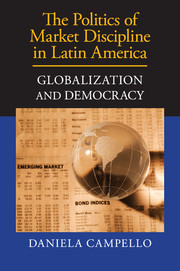Book contents
- Frontmatter
- Dedication
- Contents
- List of Illustrations
- List of Tables
- Acknowledgments
- 1 Globalization, Democracy, and Market Discipline
- 2 Between Votes and Capital: Redistribution and Uncertainty in Unequal Democracies
- 3 Investors' “Vote” in Presidential Elections
- 4 The Politics of Currency Booms and Crises: Explaining the Influence of Investors' “Vote”
- 5 Currency Crisis, Policy Switch, and Ideological Convergence in Brazil
- 6 Exogenous Shocks and Investors' Political Clout in Ecuador
- 7 One President, Different Scenarios: Crisis, Boom, and Market Discipline in Venezuela
- 8 “Vivir con Lo Nuestro”: Default and Market Discipline in Argentina
- 9 Who Governs? Market Discipline in the Developed World
- 10 Conclusion: Markets' Vote and Democratic Politics
- References
- Index
8 - “Vivir con Lo Nuestro”: Default and Market Discipline in Argentina
Published online by Cambridge University Press: 05 April 2015
- Frontmatter
- Dedication
- Contents
- List of Illustrations
- List of Tables
- Acknowledgments
- 1 Globalization, Democracy, and Market Discipline
- 2 Between Votes and Capital: Redistribution and Uncertainty in Unequal Democracies
- 3 Investors' “Vote” in Presidential Elections
- 4 The Politics of Currency Booms and Crises: Explaining the Influence of Investors' “Vote”
- 5 Currency Crisis, Policy Switch, and Ideological Convergence in Brazil
- 6 Exogenous Shocks and Investors' Political Clout in Ecuador
- 7 One President, Different Scenarios: Crisis, Boom, and Market Discipline in Venezuela
- 8 “Vivir con Lo Nuestro”: Default and Market Discipline in Argentina
- 9 Who Governs? Market Discipline in the Developed World
- 10 Conclusion: Markets' Vote and Democratic Politics
- References
- Index
Summary
The chapters on Ecuador and Venezuela have highlighted how market discipline varies with cycles of currency booms and crises that, in both countries, were triggered by factors exogenous to governments' decisions.
The experiences of Lucio Gutiérrez and Hugo Chávez illustrate the argument that leftist presidents elected under severe dollar scarcity frequently chose to renounce campaign promises and advance orthodox economic policies in an attempt to boost market confidence and attract capital inflows to the economy.
In contrast, both Rafael Correa and the same Chávez after 2003 benefitted from a wide room to deviate from market preferences, in a scenario of oil price boom and high international liquidity. Rather than advancing (or maintaining, in the case of Chávez) an investor-friendly agenda, both seized the opportunity to pursue an interventionist and redistributive economic program.
The experience of Argentina since 2002 is also one in which a government gained substantial autonomy from financial market discipline compared to its predecessors. Different from Ecuador and Venezuela, however, this autonomy did not result primarily from an exogenous shock; it was rather a consequence of a previous governmental decision to default on the country's public debt. By unilaterally reducing Argentina's external financial obligations, the default relieved following governments from the need to resort to financial markets or to the International Monetary Fund (IMF) to fund them.
Contrary to the cases of Chávez and Correa, in which an increased supply of foreign exchange widened governments' autonomy from international finance, under Néstor Kirchner this autonomy resulted from a drastic reduction of Argentina's foreign obligations. After 2004, the commodity price boom that encompassed most Latin American emerging economies, coupled with the refusal of some bondholders to accept the terms offered by the debt restructuring, limited both the Kirchner and later the Fernández governments' necessity and capacity to return to international financial markets for the following decade.
The combination of the default and the commodity boom allowed President Kirchner to advance policies substantially distinct from those demanded by investors and multilateral institutions, in both the macro-and microeconomic arenas.
- Type
- Chapter
- Information
- The Politics of Market Discipline in Latin AmericaGlobalization and Democracy, pp. 159 - 187Publisher: Cambridge University PressPrint publication year: 2015

